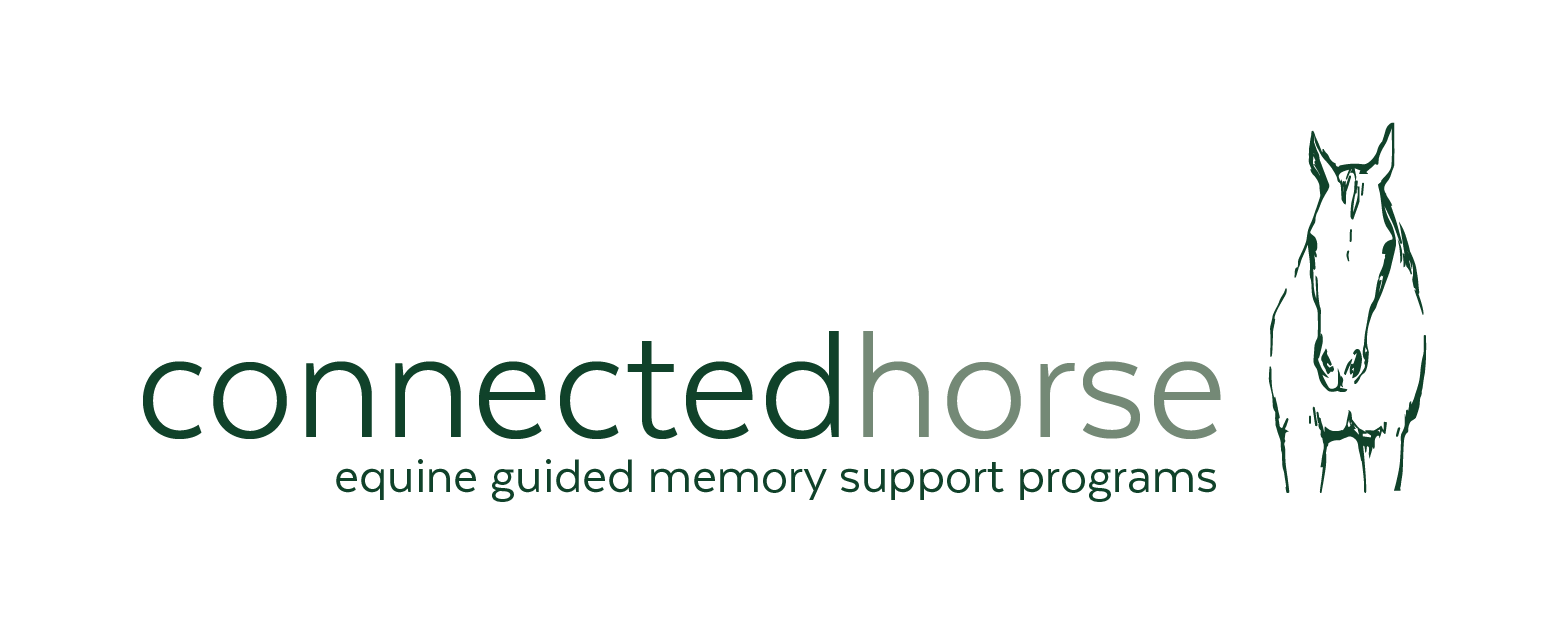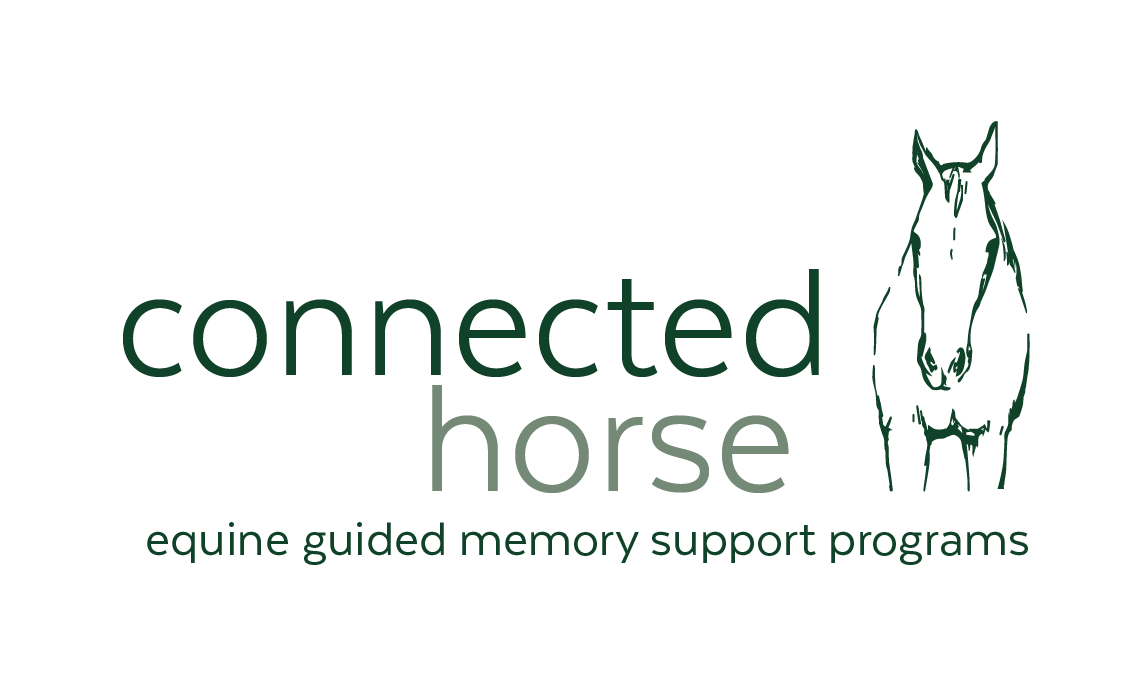Research
Equine-guided support pilot study evaluated
The Study
The Equine Guided Support Pilot Study, conducted in partnership with UC Davis and Stanford University, measured the effectiveness of the Connected Horse equine-guided workshops on stress reduction and quality of life indicators for people affected by early-stage dementia and their care partners. The Connected Horse program is the first of its kind to assist people with early-stage dementia and their care partners.
Research Summary
Over 55 million people have dementia worldwide. In the Unites States, more than 6 million people are living with Alzheimer’s. This number is projected to rise to nearly 13 million by 2050. Every year, there are nearly 10 million new global cases. Additionally, people are being diagnosed earlier in the process. Living with and providing care for someone affected by early-stage dementia is becoming more of a global reality.
Family caregiving remains the most common form of care both in the U.S. and around the world. Yet few specific services exist to meet the needs of this population and their family caregivers. Research from around the world finds that stress, anxiety, and depression typify experiences for caregivers.
The Equine Guided Support Study, conducted over Fall 2016 and Spring 2017, investigated an innovative approach that offers opportunities for stress reduction and social engagement. It holds considerable promise for application beyond the San Francisco Bay Area where it was conducted.
The Pilot
The Equine Guided Program Pilot brought a total of 26 participants (13 pairs) to a Bay Area equine facility. The program included an introduction to the facility, followed by two five-hour workshops that focused on therapeutic activities with horses. Activities with horses were intended to teach non-verbal communication skills to both care partners (CPs) and persons living with dementia (PWD) and included observing herd behavior, grooming, leading, and connecting with horses over the fence. Trained staff and facilitators led discussion groups that offered and taught awareness exercises and invited reflection on the experiences with the horses.
Pre/post-test design used standardized measures of stress, burden, mood, and social support for both care partners and PWD. The pilot was conducted in two workshops Eighteen participants completed the workshop and all standardized assessments. Eight participants completed modified, shortened programs and/or only completed partial assessments.
The Results
Quantitative and qualitative findings indicated a significantly increased positive perception of social support, a greater sense of reciprocity, awareness, upliftedness, and appreciation of one another in pairs. Trends for improved mood in both members of the pairs were also noted.
All participants, facilitators, and researchers reported experiencing a more positive mood and affect after interacting with the horses in the equine-guided support workshops.
”All participants, facilitators and researchers reported experiencing a more positive mood and affect after interacting with the horses in the equine guided support workshops.
Meet the Research Team
University of California, Davis (2016-2018)
Sarah Tomaszewski Farias, PhD — Principal Investigator, Professor of Neurology, Davis Medical Center, Alzheimer’s Disease Research Center.
Claudia Sonder, DVM — Director, School of Veterinary Medicine, Center for Equine Health.
Liz Williams, MA — Lead Facilitator, Connected Horse Workshops and curriculum development.
Elke Tekin — Community Outreach Coordinator and Connected Horse Board Member, specializing in case management and education for elders and families.
Paula Hertel, MSW — Program Director and Connected Horse Co-Founder/Board Member, specializing in programs supporting older adults, care partners, and professionals.
Nancy Schier Anzelmo, MSG — Education Director, dementia care practitioner, and Connected Horse Co-Founder/Board member, specializing in programs that support person-centered care for those living with dementia.
Elizabeth Landsverk, MD — Research Study Medical Advisor and geriatrician specializing in dementia care, adjunct professor at Stanford University and founder of Elder Consult Geriatric Medicine.
Stanford University (2015-2016)
Dolores Gallagher Thompson, PhD — Principal Investigator and Professor of Research, Department of Psychiatry and Behavioral Sciences, Stanford University.
Nusha Askari, PhD — Project Coordinator and Academic Program Professional, Stanford ADRC, Department of Neurology and Neurological Sciences, Stanford University.
Ann Choryan Bilbrey, PhD — Assistant Project Coordinator and Postdoctoral Research Fellow, Department of Psychiatry and Behavioral Sciences, Stanford University.
Jacqueline Hartman — Curriculum Developer & Lead Facilitator, co-founder of the Stanford University Red Barn Leadership Program and curriculum/program developer for equine-guided leadership.
Elizabeth Landsverk, MD — Research Study Medical Advisor and geriatrician specializing in dementia care, adjunct professor at Stanford University and founder of Elder Consult Geriatric Medicine.
Elke Tekin — Community Outreach Coordinator and Connected Horse Board Member, specializing in case management and education for elders and families.
Paula Hertel, MSW — Program Director and Connected Horse Co-Founder/Board Member, specializing in programs supporting older adults, care partners and professionals.
Nancy Schier Anzelmo, MSG — Education Director, dementia care practitioner and Connected Horse Co-Founder/Board member, specializing in programs that support person-centered care for those living with dementia.
Facts on Dementia and Caregiving
Dementia describes a group of symptoms including memory and mental processing changes, Alzheimer’s Disease is one cause of dementia.
Approximately 1 in 9 people ages 65 and older has Alzheimer’s dementia.
Almost two-thirds of Americans with Alzheimer’s dementia are women.
Older Black and Latino people are more likely than White people to be affected by dementia.
Women comprise two-thirds of all people providing care for someone affected by dementia.
More than 11 Million people in the U.S. provide unpaid care for a family member or friend with dementia.
Participation in activities that are meaningful and “maintaining a sense of self identity and relationships to others” are key factors identified by the Alzheimer’s Association for improving quality of life for affected people and care partners.
Data from the Alzheimer’s Association publication, Alzheimer’s Facts and Figures, 2023


